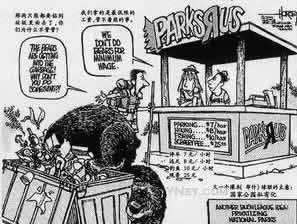| Privatizing the national parks |
| http://www.sina.com.cn 2003/08/22 10:00 北京青年报 |
Things are different now. In control of both houses of Congress, the GOP is seeking ways to downsize the federal bureaucracy by outsourcing in the private sector. Recently it was revealed that Republican administrators were considering schemes to privatize large parts of the National Park Service and the National Forest Service. This raised howls of protest from numerous quarters. For many of the people who work for these two agencies, the public stewardship of nature is less a job than a calling.①You will notice this yourself if you ever visit America's national parks. The park rangers are immensely proud of the wonders they protect, and it shows in their attitude toward the public, in their friendly eagerness to awaken the same devotion in visitors. David Horsey imagines a future in which management of the national parks has been turned over to corporations. A hiker demands that bears be stopped from rampaging through the garbage, but the two "rangers" are unmotivated young people working for the federal minimum wage; dealing with bears is not in their job description. The park has been commercialized: "Parks R Us" imitates the name of a well-known chain of toystores, Toys R Us. The sign on the hut states the fees for various services, and the main function of these employees seems to be sales, not conservation. For Horsey, privatizing the national parks is a "bush league idea". In professional baseball, a bush league is a "minor league", not a "major league" with first-rate players. Major-league teams play in ballparks; minor league teams play, metaphorically, "out in the bushes" away from big cities. But the cartoonist is making a pun here, as bush league is also "Bush league", second-rate because it comes from people with minds like that of President George W. Bush. |
| 漫画评说:国家公园是否也要私有化 |
自上个世纪20年代到40年代,共和党以不愿支持政府职能而著称,他们想要的是“小”政府和低税率,主张百姓个人的经济困窘留给他们自己去解决。冷战期间,共和党改变了立场,开始支持庞大的军事预算,但从来没有松懈过对社会公共支出的反对。由于共和党在90年代之前在国会是少数党,也就不得不顺从民主党在公共事业上大笔花钱。 但如今可不一样了,在控制了参众两院后,共和党正在设法通过从私有企业中寻找经营者来削减联邦政府的机构。最近,有消息说共和党官员正在考虑一项计划,要将国家公园管理局与国家森林局的大部分私有化,这就引起了很多地方的抗议声浪。对于在这两个机构工作的人员来说,为大自然服务不仅仅是个职业,更是一种使命。如果你游览过美国的国家公园,就会看到这一点。护林员们对他们所保护的天然奇景无比自豪,这从他们对待公众的态度上,从他们友善地要在游览者当中唤起对大自然同样的挚爱的那种热切中可以看到。 漫画家戴维-霍西在此想象了未来的情景,那时国家公园已经交给了私人公司。一位游人提出要求,应制止熊在垃圾箱上乱刨,但是两个“护林员”是没有工作动力的年轻人,他们做这份工作只是为了拿到法定的最低工资,而处理熊的问题则不在他们的工作范围之内。 这个公园已经商业化了,“Parks R Us”(公园是我们的)是模仿众所周知的玩具连锁店的名字Toys R Us,小屋上的价目表标明了各种服务的费用,这些员工的主要职能似乎就是做买卖,而不再是保护大自然了。 在霍西看来,国家公园私有化是个“灌木球联的主意”。在职业棒球运动中,一个灌木球联是个“小球联”而不是有着一级球员的“大球联”。大球联的队在棒球场里打球,而小球联的队则在大城市外面的“灌木丛生的地方”打球,当然这只是个比喻。但是漫画家在此用的是双关语,因为灌木球联就是“布什球联”——一个二流的球联,因为它的人员组成都是头脑像布什总统那样的人。 |
| 【英语学习论坛】【评论】【大 中 小】【打印】【关闭】 |
 From the 1920s through the 1940s, Republicans were famously reluctant to support government services. They wanted government small and taxes low, with individuals in economic trouble left to fend for themselves. During the Cold War, Republicans switched gears and supported vast military budgets, but they never relaxed their opposition to social spending. But the Republicans were the minority party in Congress until the 1990s, forced to defer to Democratic big spenders.
From the 1920s through the 1940s, Republicans were famously reluctant to support government services. They wanted government small and taxes low, with individuals in economic trouble left to fend for themselves. During the Cold War, Republicans switched gears and supported vast military budgets, but they never relaxed their opposition to social spending. But the Republicans were the minority party in Congress until the 1990s, forced to defer to Democratic big spenders.